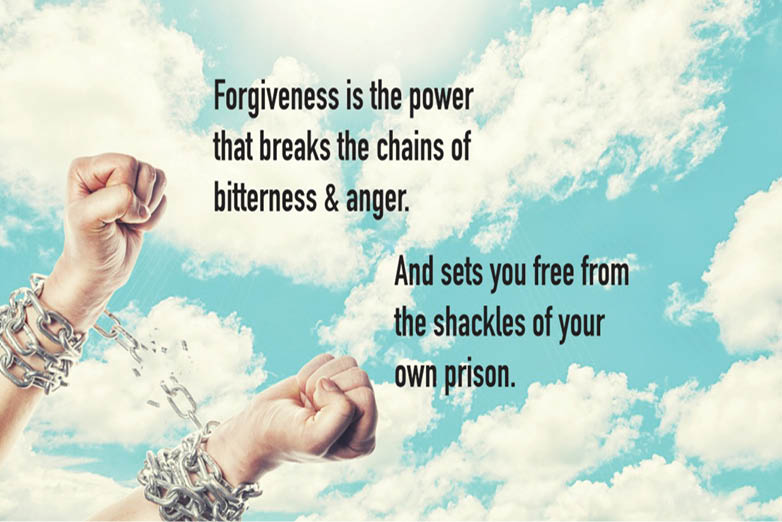Veera is a published Author (‘Endured’ and ‘#LoveBitesLifeHacks’) and Columnist; a passionate Educator and Counsellor; Poet and Philosopher… but most of all, a lover of all things literary.
There is no knowing what people will do when they are about to die, but one thing is for certain, a human heart bleeds for forgiveness at death’s door. Life starts as a clean slate, an empty book, gradually filled with your own hand and what destiny doled out generously, or held back tightly with meagre stance. But as the days to death come knocking and as your time draws nearer still, a conscious mind learns to clear the debris from the wreckage left by an ailing heart and a guilty mind.
As the night descends it is natural to brim over with every kind of sentimentality under the sun. Every day, you grow only more extravagantly wistful, especially in the evenings of your time here on earth, and emotions tend to spill their ink on pages written in a script that only you seem to understand. You read your life’s book slowly, clearly, each word – a moment in time shared, lived, drawn on, without a rare sense of sorrow or disapproval, that the living years might otherwise have embarrassed your understanding. You put yourself in a place, cool and patient, calm and discerning, before you even begin to count the days to your end. Of the many parts of life we cannot escape, being hurt at the hands of another is especially painful. The reality of inviting other people into our lives is that we will at some time get hurt or we will eventually cause pain to others. That is the natural law all just the consequence of living a life. We may be selfish or selfless in turn hurting or being hurt. We could be deeply damaged by strangers or friends still. We may lash out or be privy to lose tongues and careless words. We could have painful seasons and never address the hurt or the person accountable for it. You may feel trapped, you may feel wrecked.

Now Forgiveness is such a beautiful concept. We certainly welcome it when we have made a mistake, acted inappropriately or hurt someone else. But forgiveness is rather difficult when we have been severely wounded. Everyone thinks forgiveness a lovely idea until they have something to forgive. Anyone who has suffered a grievous hurt knows just how difficult true forgiveness really is. Sometimes the wounds are so very deep that your whole inner world is rudely disrupted.
Imagine a spouse or a parent betraying your trust, or you being the victim of an egregious crime or some life-altering abuse. Unfairly, the subject of some malicious slander or been harshly bullied. The turmoil and pain of it all so intense so deep – neither forgiveness nor forgetting seems a viable option. To think that forgiveness demands forgetting can be emotionally devastating. Sometimes you have been so deeply wounded and injured from the sinful actions or wrongdoings of others that forgiveness may seem farfetched and unfair. How is it even possible to ever forgive someone who has painfully disrupted and changed the course of your life? What if your wounds are not inflicted by a single random offensive act but a result of repeated deception and duplicity of the offender?
Forgiving someone does not mean you do not feel the pain of their offense any longer. Sometimes you have no choice but to move on from all that overwhelming hurt and injury. You could even be numbed. The absence of pain is not necessarily an indication of forgiveness. So what is forgiveness really? Psychologists generally define forgiveness as a conscious deliberate decision to release feelings of resentment or vengeance towards someone who has harmed you. Forgiveness does not mean forgetting, nor does it mean condoning or excusing offences. It is neither minimising nor justifying the wrong meted out. To forgive the person is not excusing the act itself. Most importantly, forgiveness is neither about reconciling nor condoning. Forgiveness is given, despite never being asked for it.
True forgiveness is an apology you give yourself for another’s wrongdoing. It is a gift to yourself and a positive step in moving forward. Forgiveness is rarely a one-time climatic event. It is about cancelling an old debt; it is about starting with a clean bill of health for your soul. Forgiveness, however troublesome, is about absolution-excusing the other from blame and guilt or even responsibility for their misdeeds. In a nutshell, it simply means to let the other person off the hook. We sometimes imagine it as symbolically setting them free from having to carry the burden of suffering and guilt they may believe they’ve caused.
But what about all those times when an apology was never given, or there were no signs of remorse or contrition. What if they choose to continue the same negative patterns that caused the offense or hurt in the first place? What if, in fact, the person who caused you the most harm, believes they are still blameless? What if they are convinced their behaviour was warranted? How difficult is forgiveness then? Paradoxical as the act of forgiveness is, withholding forgiveness until we receive an apology or see remorse, is to relinquish control of our peace and future to one another. Forgiveness then becomes a deliberate act of kindness to oneself.
Forgiveness is about healing oneself. For some, it could come on suddenly, blessedly, almost like an epiphany of goodness without trying to think about it or create it. For others, it’s a more deliberate process that may require time, effort and constant practice. But however you choose to forgive, the reward you reap is intense for your soul. Forgiveness may wash upon you like the crash of waves or simple flow and ebb with feelings like the tide. There are infinite paths and different colours to forgiveness but true forgiveness is one’s ability to meet the present moment with openness. Forgiveness means viewing and enjoying life without the lens of anger and resentment and the residue from the past. To put it simply, “Forgive not for all the hurt they caused you, but forgive for all the lessons they taught you!”
- Walk Away! - 20 April2024
- Brain Power - 6 April2024
- Celebrating Our Iranian Brethren! - 16 March2024
